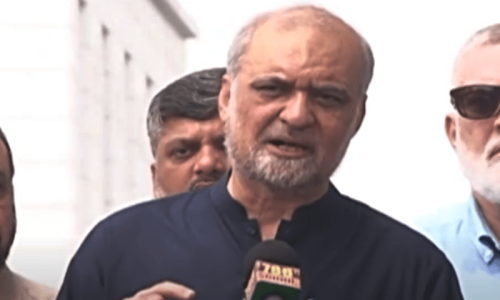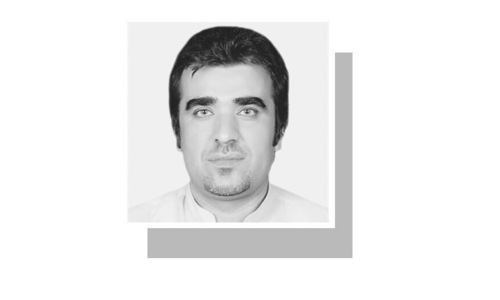KARACHI: “My name is Neha and on this International Women’s Day I appeal to the government to end forced conversions and pass strong legislation so that this does not happen to another girl,” said the visibly emotional teenager as she gasped for air.
Trying to gather courage as she addressed a subdued crowd and reporters at the Aurat March event on Monday, she said, “I was 14 years old. What was my fault? My family, my education was taken away from me.”
The young girl was abducted from Karachi’s Ittehad Town in 2019 and was a victim of forced conversion and child marriage. Sharing that her case lingered on for two years, she urged the government to look into the issue.
The Aurat March 2021 saw fewer participants than previous years, with the ongoing Covid-19 pandemic and strict security checks at the event being cited as reason for lesser numbers.
This year’s Aurat March witnesses fewer participants because of Covid-19 restrictions
Though no untoward incident took place at the event, accusations were hurled at the role of a shelter home and the role of the judiciary when it came to dealing with the cases of forced conversions and marriages.
On the occasion, a representative of the shelter home in question refuted serious allegations levelled by an Aurat March participant, who accused the shelter of siding with the abductors of another Christian girl who was converted and married off to an older man.
“Thousands of girls have taken refuge at the centre in the last 20 years,” she said, adding that her 40-year struggle focussed on safeguarding the rights of women and minorities.
“Arzoo came to us through a court order. Shelter’s role is to protect her, counsel her and give her legal help. She has been living with us for the last three months. If the court asks us to produce her, we are bound to produce her,” she said.
“We are against child marriage and will never take any steps that are detrimental to a child. If she has given a statement and is refusing to go with her parents, how is the shelter responsible for it,” she asked and stressed that the shelter could not hand over the child to her parents as the courts have to decide.
Discrimination against transpersons highlighted
Sharing the discrimination faced by the transgender community amid the ongoing pandemic, transwoman Shahzadi said, “So many hospitals refused to admit khawaja siras, so many doctors refused to treat us because we are out on the streets and carrying the virus.”
She urged the government to formulate a policy for transgender persons, including the implementation of a two per cent job quota for them.
Along with representation of women from the Hindu community and fisherfolk, the Aurat March also had families of Baloch missing persons in attendance.
Sami Din Mohammad Baloch, the daughter of a missing person, narrated her ordeal. She was 10 years old when her father was allegedly picked up.
“My father was a government servant. He was picked up at 1am, they covered his eyes and dragged him away,” she said, adding that her sibling “does not know if she is an orphan or not”.
She said her mother did not know if she was a widow or not. “If they [missing persons] have done something present them in courts, why are we being punished? Why are my mother and sister being punished?”
Sami reminded the audience that she walked 3,000 kilometres to get to Islamabad to raise the issue of missing persons.
Fatima Majeed from the fisherfolk community said: “Our women are treated as izzat (honour), our women are not treated as insaan (humans). A woman is not honour, she is a human, deserves equality. Any legislation that takes place, women must be part of it.”
“We have been left out in the name of development. Gizri was a small village, today it’s DHA. The fisherfolk village is lost in DHA,” said Majeed as she narrated how the fishing community in Karachi lost out on its land.
Gender-based violence reporting centres demanded
As part of its 15-point agenda, the Aurat March demanded child protection bureaus and gender-based violence reporting centres across Sindh.
It further demanded help desks for women, transgender and non-binary people to report violence and induction of more female medico-legal officers (MLOs).
The participants of the march demanded enforcement of the Protection against Harassment of Women at the Workplace Act, 2010 as well as decriminalisation of Section 499 and 500 of the Pakistan Penal Code.
It called for child protection bureaus to be set up across Sindh and that the provincial bill proposed by the transgender community be passed and adopted.
They demanded the federal government end extrajudicial killings in provinces and release all missing persons.
The 15-point agenda condemned the citywide demolition of houses in the name of an anti-encroachment drive.
They protested the sexist treatment of transgender and non-binary individuals in the media and demanded a gender-inclusive policy on media from the Pakistan Electronic Media Regulatory Authority.
Published in Dawn, March 9th, 2021












































